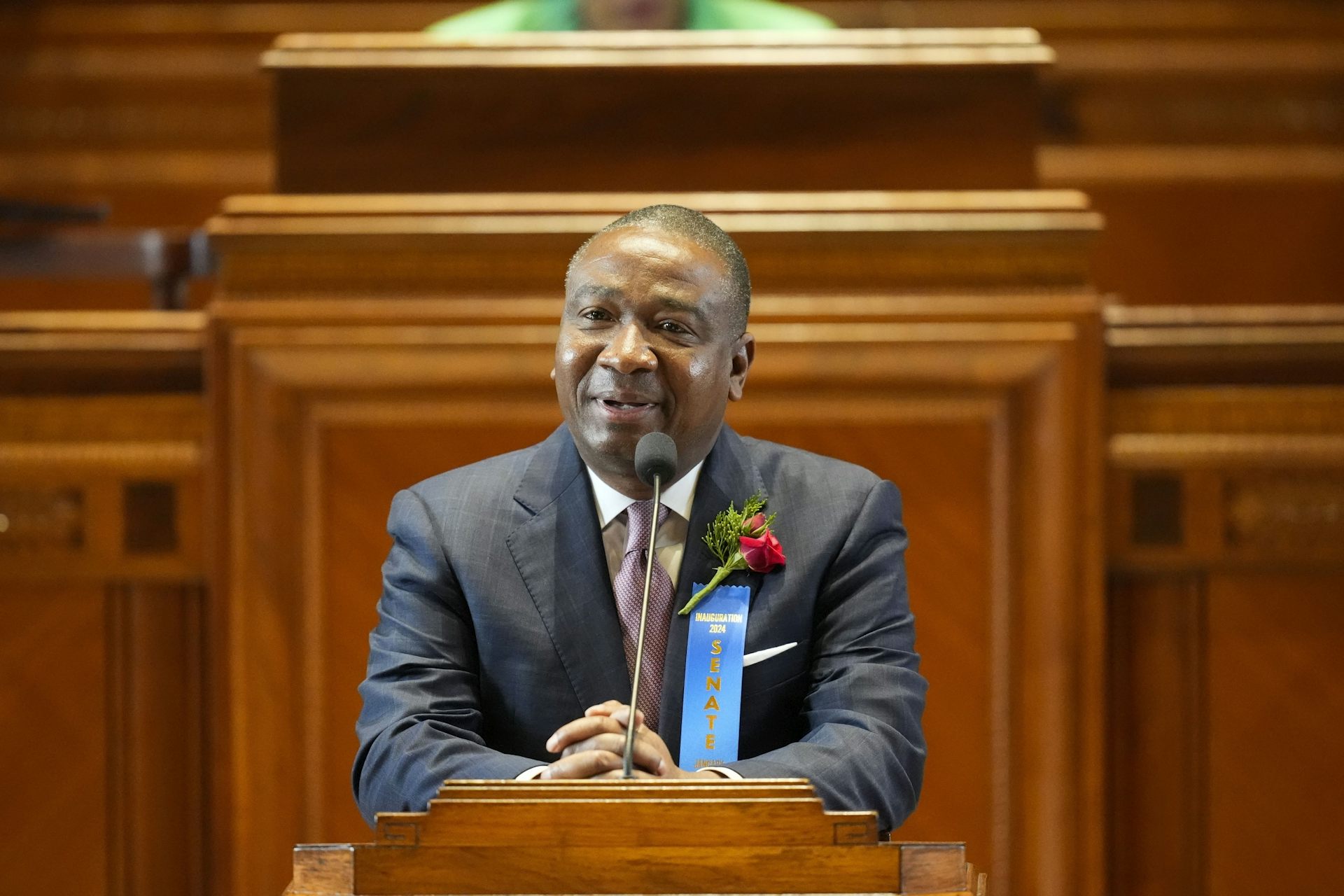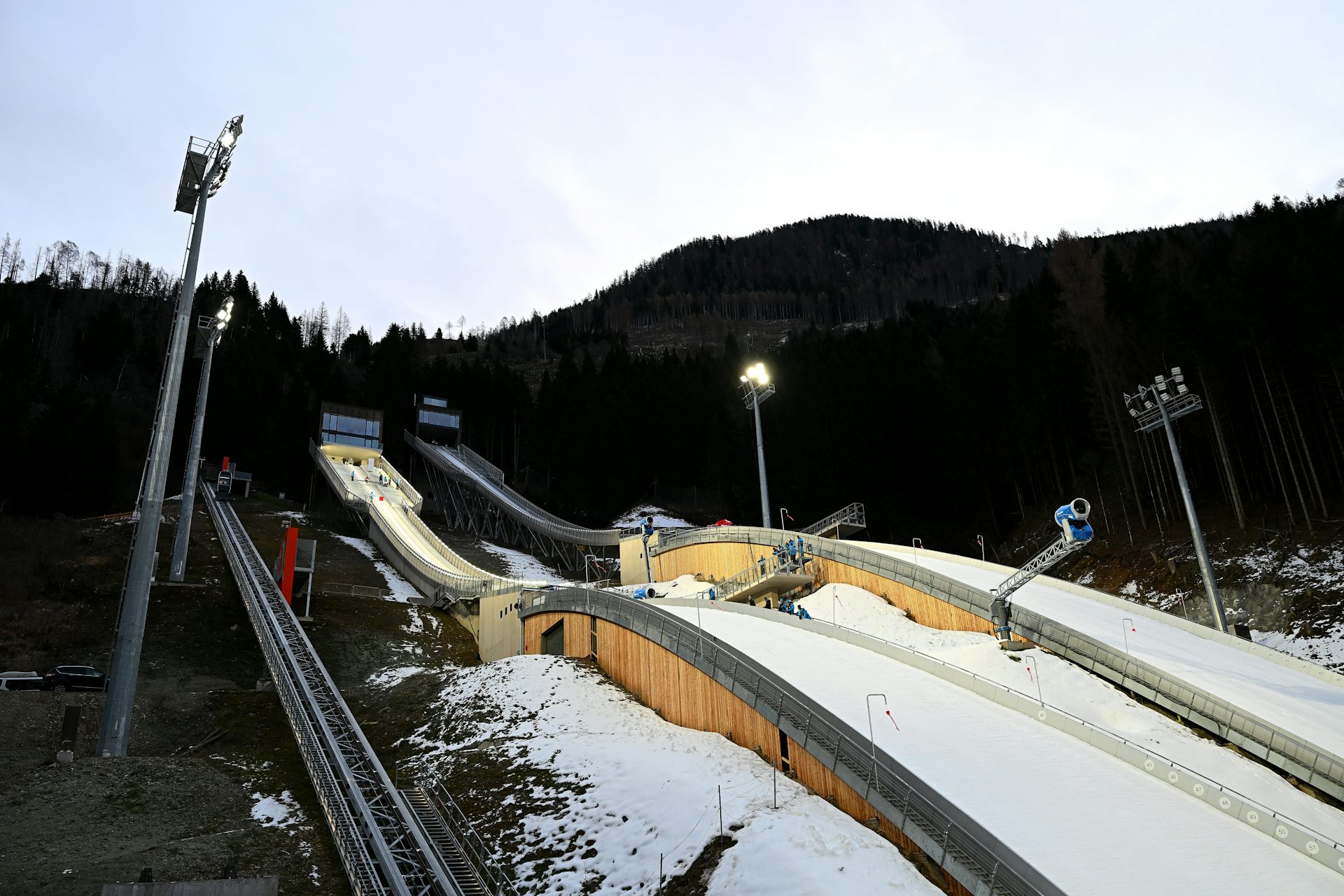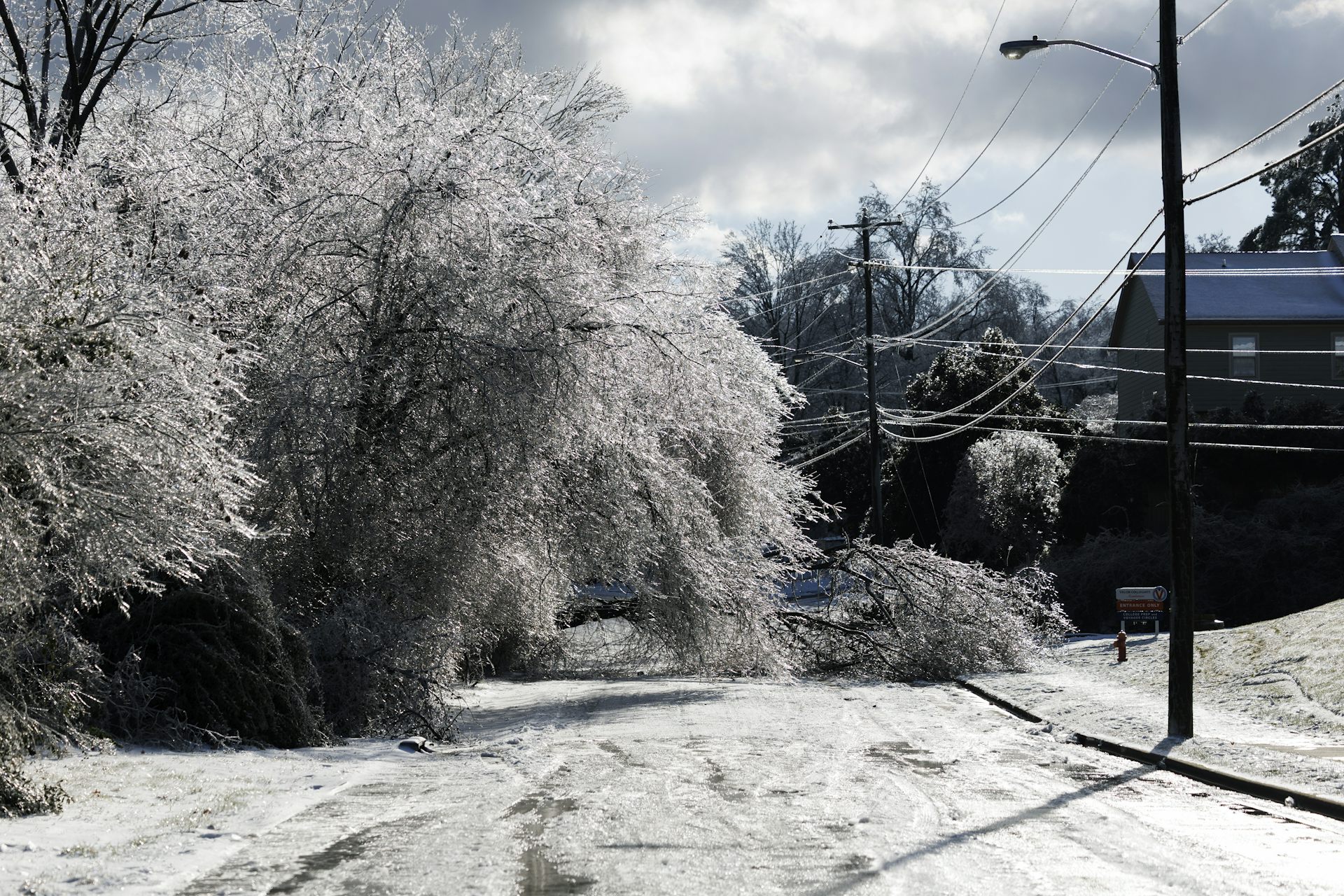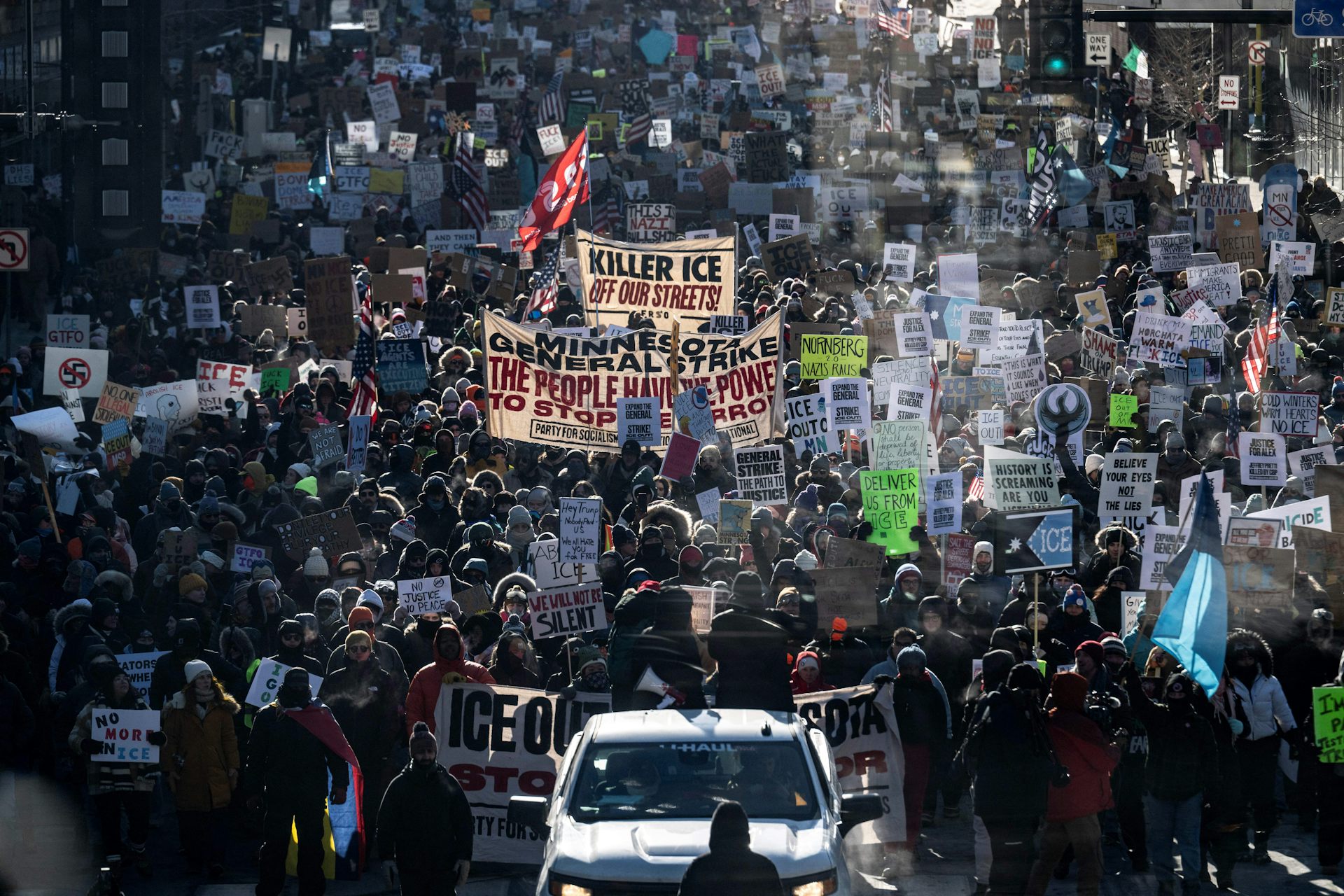When Putin says Russia and Ukraine share one faith, he's leaving out a lot of the story
Religion plays an important role in expansive views of Russian nationhood. But faith has played a role in Ukrainian nationalism, too.
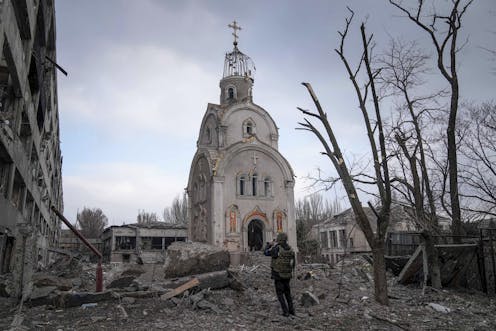
Russian President Vladimir Putin has often asserted that Russians and Ukrainians are “one people.” He points to a few factors: the Russian language spoken widely in both countries, their similar cultures, and the two countries’ political connections, which date back to medieval times. But there is one more factor that ties all these together: religion.
Grand Prince Volodymyr, leader of the kingdom of Kyiv, converted to Christianity in the 10th century and forced his subjects to do the same. As Putin sees it, Orthodox Christianity established a religious and cultural foundation that outlasted the kingdom itself, creating a shared heritage among the people who live in present-day Russia, Ukraine and Belarus.
As a historian of religion and nationalism in Ukraine and Russia, I see Russia’s invasion as, in part, an attempt to restore this imagined “Russian World.” More than 7 in 10 Ukrainians identify as Orthodox Christians, similar to the percentage in Russia.
But what Putin’s claims ignore is a uniquely Ukrainian religious heritage that transcends church institutions and has long nourished Ukrainians’ sense of nationhood. Many Ukrainians throughout history have seen religion as something that asserts their separateness from Russia, not their commonality.
Kyiv vs. Moscow
Under imperial Russia, the Russian Orthodox Church was often a tool of assimilation, with officials eager to use the power of the church to make newly conquered peoples Russian subjects.
Beginning in 1654, when Ukrainian lands were being absorbed into imperial Russia, clergy from Moscow had to decide how to accommodate distinct religious texts, practices and ideas from Kyiv that differed from Moscow’s in subtle yet significant ways. Believing some of the Kyivan practices to be more closely aligned with the Byzantine roots of the Orthodox Church, Russian clergy decided to integrate Ukrainian rituals and priests into the Russian Orthodox Church.
Later, some members of the clergy helped promote the idea of Russian and Ukrainian unity, rooted in Orthodox faith. Yet 19th-century Ukrainian activists took a different view of this history. They saw the Russian Orthodox Church as a tool of empire. In these activists’ view, the church had adopted Ukrainian traditions in the name of spiritual unity while actually denying Ukrainians’ distinct identity.
These nationalist activists did not abandon Orthodox Christianity, however. As they pushed for an autonomous Ukraine, they asserted there was a difference between the politics of the church institution and the everyday religion that foregrounded Ukrainian life.
In the shadow of empire
Not all Ukrainians lived in the spiritual realm of Moscow. A Ukrainian national movement also grew in the west, in former Kyivan lands that ended up in the Austro-Hungarian Empire. Here many in the population were members of a hybrid religious institution, the Greek Catholic Church, which practiced Orthodox rituals but followed the pope.
Local parishes in the Greek Catholic Church became important in the national movement as religious institutions that distinguished Ukrainians from not only Russian neighbors to the east, but also from the local Polish population in Austria-Hungary. But Ukrainian activists grappled with how to build a nation that was split between these two main faiths: the Russian Orthodox Church and the Greek Catholic Church.
When imperial Russia collapsed in 1917, one of the first acts of the new Ukrainian government formed in Kyiv was declaring its own Orthodox Church, separate from Moscow: the Ukrainian Autocephalous Church. The church was intended to use the Ukrainian language and to empower local parishes more than the Russian Orthodox Church had allowed.
As the Austro-Hungarian Empire collapsed, the leader of the Ukrainian Greek Catholic Church, Andrei Sheptytsky, put forward a plan for a unified Ukrainian Church under the Vatican but grounded in Orthodox ritual. He hoped such a church could bring Ukrainians together.
But these plans never materialized. The independent government in Kyiv was defeated by the Bolsheviks by 1921, and the Ukrainian Orthodox Church based in Kyiv was banned by the Soviet Union.
Crackdown on ‘nationalist’ prayers
In the first decades of the Soviet Union, the Bolsheviks mounted a campaign against religious institutions, especially the Russian Orthodox Church. They viewed Russian Orthodoxy, in particular, as an instrument of the old regime and a potential source of opposition.
During World War II, however, the Soviet Union revived the Russian Orthodox Church, hoping to use it as a tool to promote Russian nationalism at home and abroad.
In western Ukraine, which the Soviet Union annexed from Poland in 1939, this meant forcibly converting 3 million Ukrainian Greek Catholics to Russian Orthodoxy.
Many Ukrainians proved resilient in adapting religious life to these circumstances. Some formed an underground Greek Catholic Church, while others found ways to maintain their traditions despite participating in the Soviet-sanctioned Russian Orthodox Church.
In Soviet secret police records, officers documented what they called “nationalist” practices at church: believers remaining silent when the Moscow patriarch’s name was to be commemorated, for example, or using prayer books that predated Soviet rule.
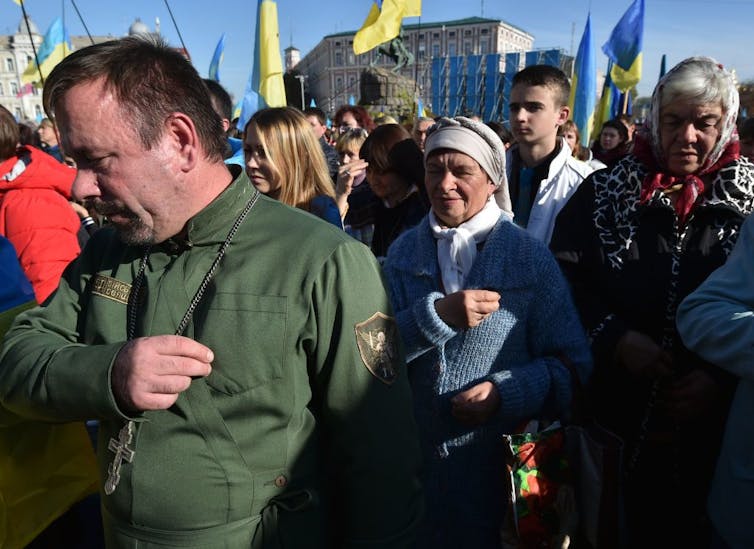
Hopes for change
When the Soviet Union collapsed, Ukraine found itself in a position to redefine the religious landscape. Some Christians became part of the Greek Catholic Church after it was relegalized. Other Christians saw this moment as a time to declare an “autocephalous” Ukrainian church, meaning they would still be in communion with other Orthodox churches around the world, but not under Moscow’s control. Still others wanted to remain part of the Russian Orthodox Church based in Moscow.
In 2019, a Ukrainian Orthodox church was recognized as autocephalous by Ecumenical Patriarch Bartholomew, the spiritual head of Orthodoxy worldwide, forming the Orthodox Church of Ukraine.
In Ukraine today, only 3% of people say they are affiliated with the Orthodox Church based in Moscow, while 24% follow the Orthodox Church based in Ukraine, and a similar percentage call themselves “simply Orthodox.”
Some Ukrainians have treated the Moscow-based church with suspicion, recognizing its close ties to Putin’s government. Yet it would be a mistake to assume that all who attend this church agree with its politics.
Putin and other leaders in Moscow have their own ideas about Orthodoxy. But in Ukraine, sacred spaces have long been where many Ukrainians fought for, and won, their right to self-determination.
[Explore the intersection of faith, politics, arts and culture. Sign up for This Week in Religion.]
Kathryn David does not work for, consult, own shares in or receive funding from any company or organization that would benefit from this article, and has disclosed no relevant affiliations beyond their academic appointment.
Read These Next
The Supreme Court may soon diminish Black political power, undoing generations of gains
The Supreme Court appears poised to abolish a key part of the Voting Rights Act. It may draw on a constitutional…
Confused by the new dietary guidelines? Focus on these simple, evidence-based shifts to lower your c
Red meat and dairy may be grabbing the headlines, but processed foods and sugary drinks remain the real…
Climate change threatens the Winter Olympics’ future – and even snowmaking has limits for saving the
Innovations have made recent Winter Games possible, but the future climate will have a big impact on…


